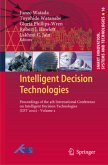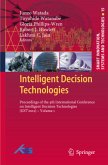One of the most challenging issues for the intelligent decision systems is to effectively manage the large-scale complex distributed environments such as computational clouds, grids, ad hoc and P2P networks, under the different types of users, their relations, and real-world uncertainties. In this context the IT resources and services usually belong to different owners (institutions, enterprises, or individuals) and are managed by different administrators. These administrators conform to different sets of rules and configuration directives, and can impose different usage policies on the system users. Additionally, uncertainties are presented in various types of information that are incomplete, imprecise, fragmentary or overloading, which hinders the full and precise determination of the evaluation criteria, their subsequent and selection, the assignment scores, and eventually the final integrated decision result.
This book presents new ideas, analysis, implementationsand evaluation of the next generation intelligent techniques for solving complex decision problems in large-scale distributed systems. In 15 chapters several important formulations of the decision problems in heterogeneous environments are identified and a review of the recent approaches, from game theoretical models and computational intelligent techniques, such as genetic, memetic and evolutionary algorithms, to intelligent multi-agent systems and networking are presented. We believe that this volume will serve as a reference for the students, researchers and industry practitioners working in or are interested in joining interdisciplinary works in the areas of intelligent decision systems using emergent distributed computing paradigms. It will also allow newcomers to grasp key concerns and potential solutions on the selected topics.
This book presents new ideas, analysis, implementationsand evaluation of the next generation intelligent techniques for solving complex decision problems in large-scale distributed systems. In 15 chapters several important formulations of the decision problems in heterogeneous environments are identified and a review of the recent approaches, from game theoretical models and computational intelligent techniques, such as genetic, memetic and evolutionary algorithms, to intelligent multi-agent systems and networking are presented. We believe that this volume will serve as a reference for the students, researchers and industry practitioners working in or are interested in joining interdisciplinary works in the areas of intelligent decision systems using emergent distributed computing paradigms. It will also allow newcomers to grasp key concerns and potential solutions on the selected topics.








